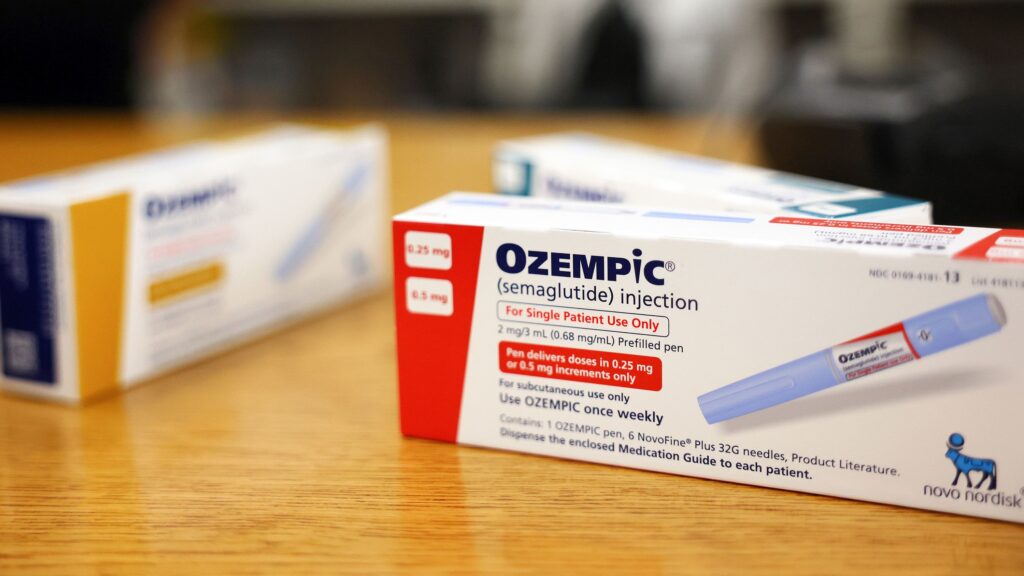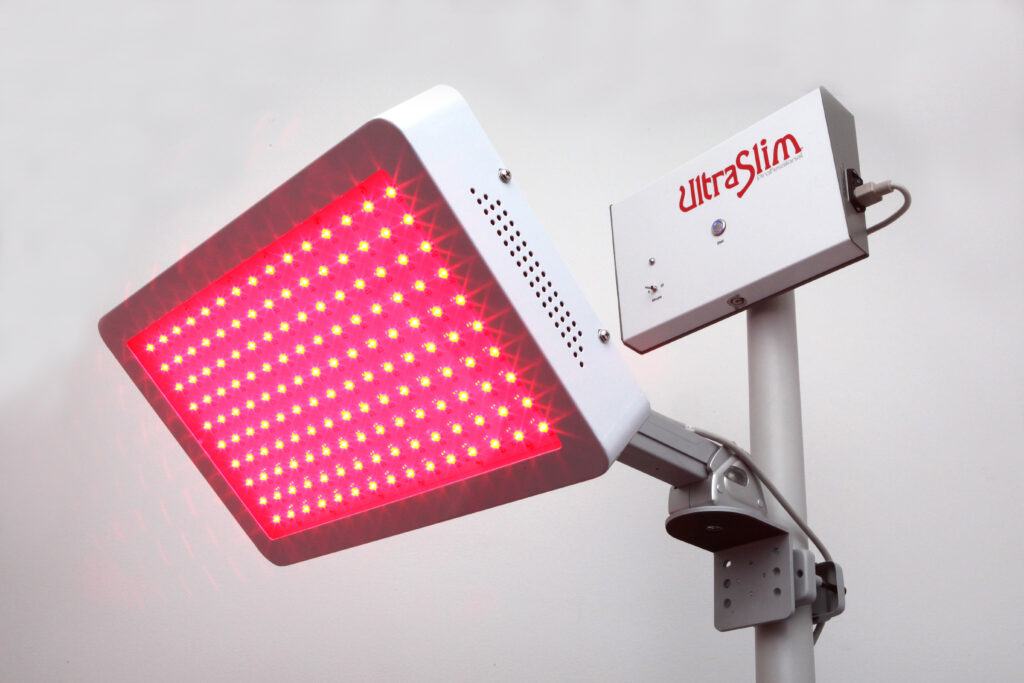
Ozempic, Wegovy and Rybelus are the name brands of the drug Semaglutide manufactured by Novo Nordisk.
Semaglutide VS. UltraSlim
What is Semaglutide?
Wegovy (semaglutide) injection 2.4 mg is indicated as an adjunct to a reduced calorie diet and increased physical activity for chronic weight management in:
– adults with an initial body mass index (BMI) of ≥30 kg/m² (obesity) or ≥27 kg/m² (overweight) in the presence of at least one weight related comorbid condition (e.g., hypertension, type 2 diabetes mellitus, or dyslipidemia)
– pediatric patients aged 12 years and older with an initial BMI at the 95th percentile or greater standardized for age and sex (obesity)
How Does Semaglutide Work?
Semaglutide is a glucagon-like peptide-1 (GLP-1) receptor agonist and occupies the GLP-1 receptor in the brain that regulates appetite. GLP-1 works to help people to lose weight in a couple ways: It targets the brain centers that regulate appetite, especially after eating, which may help you eat less, and it slows down how quickly the stomach empties, which makes you feel fuller for longer.
Semaglutide is a drug that must be taken consistently and long term to see weight loss effects. It is not a substitute for diet and exercise. As soon as someone stops Semaglutide, their body fat and former appetite tend to return to previous levels.
Semaglutide Risks & Side Effects
The risks of Semaglutide are vast, and as more people are taking them for weight loss, more findings are coming out about the issues.
Risk of Thyroid C-Cell Tumors: In rodents, Semaglutide causes dose-dependent and treatment-duration-dependent thyroid C-Cell tumors at climically relevant exposures It is unknown whether Wegovy causes thyroid C-Cell tumors, including medullary thyroid carcinoma (MTC), in humans as human relevance of Semaglutide-induced rodent thyroid C-Cell tumors has not been determined.
Wegovy is contraindicated in patients with a personal or family history of MTC or in patients with Multiple Endocrine Neoplasia syndrome type 2 (MEN 2). Counsel patients regarding the potential risk for MTC with the use of Wegovy and inform them of symptoms of thyroid tumors (e.g. a mass in the neck, dysphagia, dyspnea, persistent hoarseness). Routine monitoring of serum calcitonin or using thyroid ultrasound is of uncertain value for early detection of MTC in patients treated with Wegovy.
Acute Pancreatitis: Acute pancreatitis, including fatal and non-fatal hemorrhagic or necrotizing pancreatitis, has been observed in patients treated with GLP-1 receptor agonists, including Semaglutide. Acute pancreatitis was observed in patients treated with Wegovy in clinical trials. Observe patients carefully for signs and symptoms of acute pancreatitis (including persistent severe abdominal pain, sometimes readiating to the back, and which may or may not be accompanied by vomiting). If acute pancreatitis is suspected, discontinue Wegovy promptly, and if acute pancreatitis is confirmed, do not restart.
Acute Gallbladder Disease: Treatment with Wegovy was associated with an increased occurrence of cholelithiasis and cholecystitis. The incidence of cholelithiasis and cholecystitis was higher in Wegovy pediatric patients aged 12 years and older than in Wegovy adults. In clinical trials in adult patients, cholelithiasis was reported by 1.6% of Wegovy patients and 0.7% of placebo patients. Cholecystitis was reported by 0.6% of Wegovy patients and 0% placebo patients. Cholecystitis was reported by 0.8% of Wegovy pediatric patients and 0% placebo patients. Substantial or rapid weight loss can increase the risk of cholelithiasis; however, the incidence of acute gallbladder disease was greater in Wegovy patients than in placebo patients, even after accounting for the degree of weight loss.
Hypoglycemia: Wegovy lowers blood glucose and can cause hypoglycemia. In a trial of adult patients with type 2 diabetes, hypoglycemia was reported in 6.2% of Wegovy patients versus 2.5% of placebo patients. Patients with type 2 diabetes taking Wegovy with an insulin secretagogue (e.g. sulfonylurea) or insulin may have an increased risk of hypoglycemia, including severe hypoglycemia.
Acute Kidney Injury: There have been postmarketing reports of acute kidney injury and worsening of chronic renal failure, which in some cases required hemodialysis, in patients treated with Semaglutide. Patients with renal impairment may be at a greater risk of acute kidney injury, but some events have been reported in patients without known underlying renal disease. A majority of the events occurred in patients who experienced nausea, vomiting, or diarrhea, leading to volume depletion.
Hypersensitivity Reactions: Serious hypersensitivity reactions (e.g., anaphylaxis, angioedema) have been reported with Wegovy. If hypersensitivity reactions occur, discontinue use of Wegovy, treat promptly per standard of care, and monitor until signs and symptoms resolve.
Diabetic Retinopathy Complications in Patients with Type 2 Diabetes: In a trial of adult patients with type 2 diabetes, diabetic retinopathy was reported by 4.0% of Wegovy patients and 2.7% of placebo patients. Rapid improvement in glucose control has been associated with a temporary worsening of diabetic retinopathy.
Heart Rate Increase: Mean increases in resting heart rate of 1 to 4 beats per minute (bpm) were observed in Wegovy adult patients comparted to placebo in clinical trials. More Wegovy adult patients compared with placebo had maximum changes from baseline of 10 to 19 bpm (41% versus 34%) and 20 bpm or more (26% versus 16%). In a clinical trial in pediatric patients aged 12 years and older with normal baseline heart rate, more patients treated with Wegovy compared to placebo had maximum changes in heart rate of 20 bpm or more (54% versus 39%).
Suicidal Behavior and Ideation: Suicidal behavior and ideation have been reported in clinical trials with other weight management products. Monitor patients for depression, suicidal thoughts or behavior, and/or any unusual changes in mood or behavior.
Adverse Reactions
Most common adverse reactions (incidence ≥5%) are: nausea, diarrhea, vomiting, constipation, abdominal pain, headache, fatigue, dyspepsia, dizziness, abdominal distention, eructation, hypoglycemia in patients with type 2 diabetes, flatulence, gastroenteritis, gastroesophageal reflux disease, and nasopharyngitis.
Use in Specific Populations
Pregnancy: May cause fetal harm. When pregnancy is recognized, discontinue Wegovy. Discontinue Wegovy in patients at least 2 months before a planned pregnancy.
Pediatric: Adverse reactions with Wegovy in pediatric patients aged 12 years and older were similar to those reported in adults. Pediatric patients ≥12 years of age treated with Wegovy had greater incidences of cholelithiases, cholecystitis, hypotension, rash, and urticaria compared to adults treated with Wegovy.
What is UltraSlim?
UltraSlim is a patented fat removal
procedure that uses a specially-developed red light therapy, called PBM, or
photobiomodulation, to remove unwanted fat from targeted areas. The light affects the mitochondria in the fat cell. Mitochondria are tiny “power plants” within the nucleus of the cell. This light causes cells to create a pore
in their membrane, allowing fatty acids and triglycerides to escape. It is the only low risk body contouring device that is FDA-cleared for the immediate reduction of fat and skin tightening. It even tends to be more affordable than other weight loss procedures.
UltraSlim has no known side effects.
UltraSlim patients can realistically expect to lose from 1 to 6 inches in the first hour of treatment. However, additional weight loss can be expected with additional treatments if the treatment guidelines are followed, and a healthy,
balanced diet is consumed. Those patients who have a higher metabolic rate are prone toward better results.


